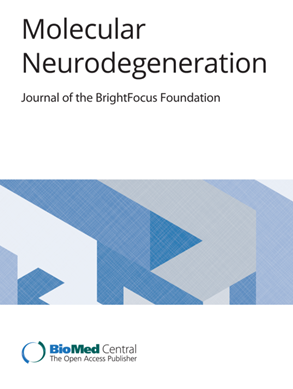Decoding microglial immunometabolism: a new frontier in Alzheimer's disease research
IF 14.9
1区 医学
Q1 NEUROSCIENCES
引用次数: 0
Abstract
Alzheimer’s disease (AD) involves a dynamic interaction between neuroinflammation and metabolic dysregulation, where microglia play a central role. These immune cells undergo metabolic reprogramming in response to AD-related pathology, with key genes such as TREM2, APOE, and HIF-1α orchestrating these processes. Microglial metabolism adapts to environmental stimuli, shifting between oxidative phosphorylation and glycolysis. Hexokinase-2 facilitates glycolytic flux, while AMPK acts as an energy sensor, coordinating lipid and glucose metabolism. TREM2 and APOE regulate microglial lipid homeostasis, influencing Aβ clearance and immune responses. LPL and ABCA7, both associated with AD risk, modulate lipid processing and cholesterol transport, linking lipid metabolism to neurodegeneration. PPARG further supports lipid metabolism by regulating microglial inflammatory responses. Amino acid metabolism also contributes to microglial function. Indoleamine 2,3-dioxygenase controls the kynurenine pathway, producing neurotoxic metabolites linked to AD pathology. Additionally, glucose-6-phosphate dehydrogenase regulates the pentose phosphate pathway, maintaining redox balance and immune activation. Dysregulated glucose and lipid metabolism, influenced by genetic variants such as APOE4, impair microglial responses and exacerbate AD progression. Recent findings highlight the interplay between metabolic regulators like REV-ERBα, which modulates lipid metabolism and inflammation, and Syk, which influences immune responses and Aβ clearance. These insights offer promising therapeutic targets, including strategies aimed at HIF-1α modulation, which could restore microglial function depending on disease stage. By integrating metabolic, immune, and genetic factors, this review underscores the importance of microglial immunometabolism in AD. Targeting key metabolic pathways could provide novel therapeutic strategies for mitigating neuroinflammation and restoring microglial function, ultimately paving the way for innovative treatments in neurodegenerative diseases.解码小胶质细胞免疫代谢:阿尔茨海默病研究的新前沿
阿尔茨海默病(AD)涉及神经炎症和代谢失调之间的动态相互作用,其中小胶质细胞起核心作用。这些免疫细胞在ad相关病理反应中经历代谢重编程,关键基因如TREM2、APOE和HIF-1α协调这些过程。小胶质细胞代谢适应环境刺激,在氧化磷酸化和糖酵解之间转换。己糖激酶-2促进糖酵解通量,而AMPK作为能量传感器,协调脂质和葡萄糖代谢。TREM2和APOE调节小胶质脂质稳态,影响Aβ清除和免疫反应。LPL和ABCA7都与AD风险相关,它们调节脂质加工和胆固醇转运,将脂质代谢与神经变性联系起来。PPARG通过调节小胶质细胞炎症反应进一步支持脂质代谢。氨基酸代谢也有助于小胶质细胞的功能。吲哚胺2,3-双加氧酶控制犬尿氨酸途径,产生与AD病理相关的神经毒性代谢物。此外,葡萄糖-6-磷酸脱氢酶调节戊糖磷酸途径,维持氧化还原平衡和免疫激活。受APOE4等遗传变异影响的糖脂代谢失调会损害小胶质细胞反应并加剧AD的进展。最近的研究结果强调了代谢调节因子之间的相互作用,如rev - erba,它调节脂质代谢和炎症,Syk,它影响免疫反应和Aβ清除。这些见解提供了有希望的治疗靶点,包括针对HIF-1α调节的策略,该策略可以根据疾病分期恢复小胶质细胞功能。通过综合代谢、免疫和遗传因素,本综述强调了小胶质细胞免疫代谢在阿尔茨海默病中的重要性。靶向关键代谢途径可以为减轻神经炎症和恢复小胶质细胞功能提供新的治疗策略,最终为神经退行性疾病的创新治疗铺平道路。
本文章由计算机程序翻译,如有差异,请以英文原文为准。
求助全文
约1分钟内获得全文
求助全文
来源期刊

Molecular Neurodegeneration
医学-神经科学
CiteScore
23.00
自引率
4.60%
发文量
78
审稿时长
6-12 weeks
期刊介绍:
Molecular Neurodegeneration, an open-access, peer-reviewed journal, comprehensively covers neurodegeneration research at the molecular and cellular levels.
Neurodegenerative diseases, such as Alzheimer's, Parkinson's, Huntington's, and prion diseases, fall under its purview. These disorders, often linked to advanced aging and characterized by varying degrees of dementia, pose a significant public health concern with the growing aging population. Recent strides in understanding the molecular and cellular mechanisms of these neurodegenerative disorders offer valuable insights into their pathogenesis.
 求助内容:
求助内容: 应助结果提醒方式:
应助结果提醒方式:


